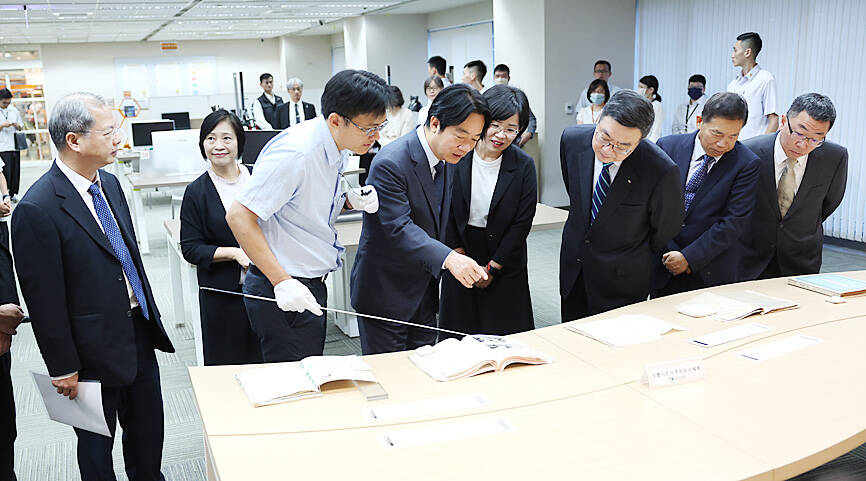Democracy should not be used against democracy, President William Lai (賴清德) said during a visit to the national archives on Commemoration Day of the Lifting of Martial Law yesterday.
Lai and Premier Cho Jung-tai (卓榮泰) visited the National Archives Administration and its reading center to review declassified records from the 228 Incident and the Martial Law era, including documents promulgated by the then-government under the National Security Act During the Period of National Mobilization for Suppression of the Communist Rebellion.
Lai said that as Tainan mayor in 2014, he observed the anniversary of the death of Tang Te-chang (湯德章), a martyr of democracy in the 228 Incident, on Tainan’s Justice and Courage Memorial Day.

Photo: CNA
The archives are a record of the authoritarian government persecuting Taiwanese and also the legacies of those affected during the struggle for democracy, he said.
The archives should appeal to the public to visit, so they could understand that the nation’s democracy would not have existed without the sacrifices made by tens of thousands of their predecessors, he added.
Lai said the martial arts novel The Legend of the Condor Heroes (射鵰英雄傳) written by late novelist Jin Yong (金庸) is one of his favorite books and it was banned during the Martial Law era.
The novel was prohibited as the government did not want Taiwanese reading stories about gallant people rising up against corruption, agency research fellow Hsu Feng-yuan (許峰源) said, adding that censorship adversely affected people’s lives.
The declassification rate of the archives has reached 99.96 percent with only 26 documents still classified, while information originally approved for permanent classification that has yet to be transferred amounts to 4,556 documents from eight cases, National Archives Administration Director-General Lin Chiu-yen (林秋燕) said in her briefing.
The agency has requested a review of the declassification and downgrading of classified records by Aug. 27, she added.
Records deemed to contain national security information should be declassified after a maximum of 40 years, with only three exceptions — if declassification could imperil intelligence agents who have collected information against China, could seriously impact national security or external relations, or could jeopardize intelligence collection against China, Lin said.
Extension to the classification period of these exceptions must be submitted to a national security meeting for approval with a maximum of three years for each extension, she said.
Cho in his speech said that Taiwan has built a democratic system after the world’s second-longest martial law of the modern era.
Declassification of the records is so the nation can be honest with historical facts and be accountable to those affected and their families, he said.
To remember history is not to remember hatred, but to prevent history from repeating itself, Cho said, citing prestigious Czech novelist Milan Kundera: “The struggle of man against power is the struggle of memory against forgetting.”
Separately, the military honor guards performed their first guard mounting at Democracy Boulevard in Taipei yesterday, after ceasing their 44-year sentry duty at the Chiang Kai-shek Memorial Hall at 5pm on Sunday.
The Ministry of Culture said the sentries were removed to fulfill transitional justice.

SECURITY: As China is ‘reshaping’ Hong Kong’s population, Taiwan must raise the eligibility threshold for applications from Hong Kongers, Chiu Chui-cheng said When Hong Kong and Macau citizens apply for residency in Taiwan, it would be under a new category that includes a “national security observation period,” Mainland Affairs Council (MAC) Minister Chiu Chui-cheng (邱垂正) said yesterday. President William Lai (賴清德) on March 13 announced 17 strategies to counter China’s aggression toward Taiwan, including incorporating national security considerations into the review process for residency applications from Hong Kong and Macau citizens. The situation in Hong Kong is constantly changing, Chiu said to media yesterday on the sidelines of the Taipei Technology Run hosted by the Taipei Neihu Technology Park Development Association. With

CARROT AND STICK: While unrelenting in its military threats, China attracted nearly 40,000 Taiwanese to over 400 business events last year Nearly 40,000 Taiwanese last year joined industry events in China, such as conferences and trade fairs, supported by the Chinese government, a study showed yesterday, as Beijing ramps up a charm offensive toward Taipei alongside military pressure. China has long taken a carrot-and-stick approach to Taiwan, threatening it with the prospect of military action while reaching out to those it believes are amenable to Beijing’s point of view. Taiwanese security officials are wary of what they see as Beijing’s influence campaigns to sway public opinion after Taipei and Beijing gradually resumed travel links halted by the COVID-19 pandemic, but the scale of

A US Marine Corps regiment equipped with Naval Strike Missiles (NSM) is set to participate in the upcoming Balikatan 25 exercise in the Luzon Strait, marking the system’s first-ever deployment in the Philippines. US and Philippine officials have separately confirmed that the Navy Marine Expeditionary Ship Interdiction System (NMESIS) — the mobile launch platform for the Naval Strike Missile — would take part in the joint exercise. The missiles are being deployed to “a strategic first island chain chokepoint” in the waters between Taiwan proper and the Philippines, US-based Naval News reported. “The Luzon Strait and Bashi Channel represent a critical access

Pope Francis is be laid to rest on Saturday after lying in state for three days in St Peter’s Basilica, where the faithful are expected to flock to pay their respects to history’s first Latin American pontiff. The cardinals met yesterday in the Vatican’s synod hall to chart the next steps before a conclave begins to choose Francis’ successor, as condolences poured in from around the world. According to current norms, the conclave must begin between May 5 and 10. The cardinals set the funeral for Saturday at 10am in St Peter’s Square, to be celebrated by the dean of the College